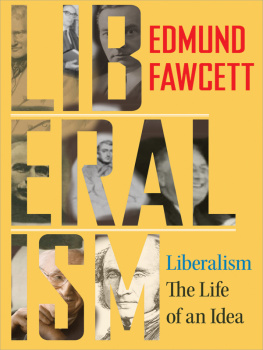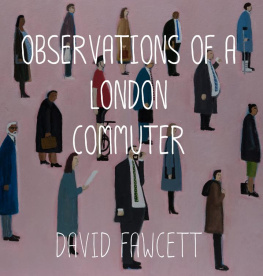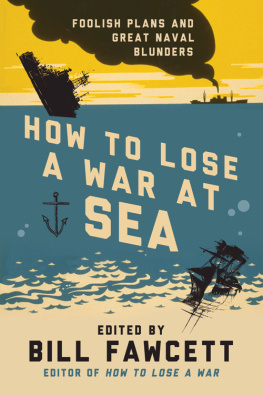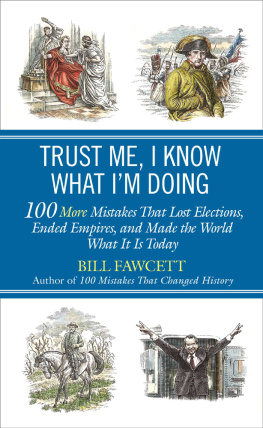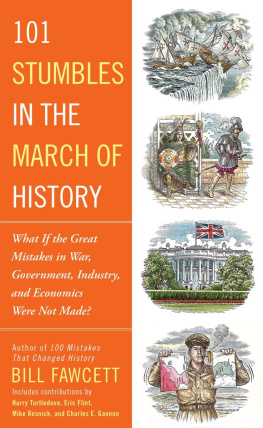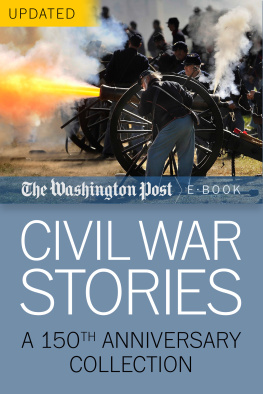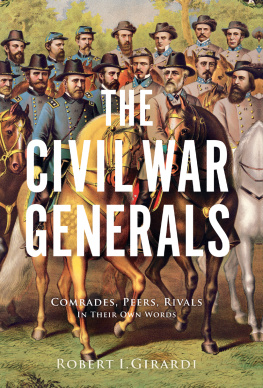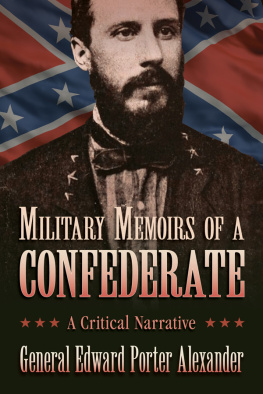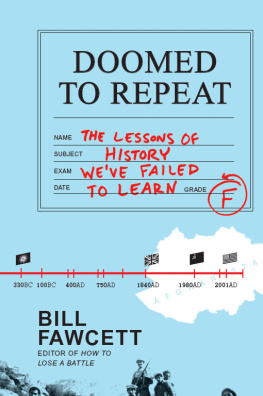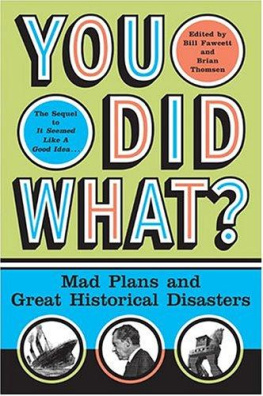How to Lose the Civil War
Edited by
Bill Fawcett

Dedication
In memory of Brian Thomsen, scholar and editor.
Contents
No Rebels in D.C.
1861: The Confederacys Failure to Capture the Union Capital
John Helfers
One of the main goals of both sides in the Civil War (actually, its a main goal in just about any war throughout history) was to capture the enemys capital. This was particularly acute for the South. General Robert E. Lee knew that the shortages the Confederacy faced in men and equipment, especially versus the massive population and manufacturing advantages of the Union, could be nullified if he could just take Washington, D.C. This would also have the added benefit of contracting the overall war. However, since Lincoln and his cabinet also realized this, they were prepared to take whatever measures necessary to ensure that it didnt happen.
Once the blinders came off after the First Battle of Bull Run (where the Union forces were soundly defeated) in 1861, and the Union realized it was in for a protracted fight, attention was given to the practically defenseless city of Washington, D.C. Under the command of General George B. McClellan and General John Gross Barnard, the chief engineer of the Army of the Potomac, the next eighteen months were devoted to building an incredible chain of forts and earthworks around the city. By the end of the year, nine miles of defensive perimeter encircled Washington, studded with 480 artillery pieces, including everything from twenty-four- and thirty-two-pound howitzers, twenty-four-pound siege guns, Parrott guns (a combination cast- and wrought-iron muzzle-loading cannon prone to breakage), and lighter-caliber artillery mounted on field carriages.
By the end of 1862, Washington was a heavily armed and protected fortress city. Fifty-three forts and twenty-two artillery batteries ringed the city proper, from the Potomac to the shoreline opposite Alexandria, Virginia. Barnard didnt leave the Virginia side empty, but constructed more forts there as well.
And still Barnard and his engineers built more. By spring of 1864, Washington was pretty much impregnable. Its defenses consisted of an interconnected string of sixty-eight forts over thirty-seven miles, along with almost one hundred artillery batteries and blockhouses (a small, single-building fort), all connected by a twenty-mile network of rifle pits and trenches. Built to contain an estimated 23,000 men, the Unions only real problem was keeping the formidable line of defenses manned, particularly toward the end of the war. Regardless of troop level, if the traditional ratio of four attackers for every defender held true, then the Confederacy would have needed to send an army of at least 60,000 to 100,000 men against the city to have a hope of conquering it. Lee could barely field the lowest number of troops, and he never approached six figures, coming the closest in 1862 with 72,500 men at Fredericksburg.
But what about earlier in the war, when the Union capital wasnt so well fortified? One theory claims that Brigadier-General P.G.T. Beauregard should have followed up his victory against the Union at the First Battle of Bull Run and pursued the Union soldiers to Washington. This would have been an ill-advised decision from the start; no matter how gallant it sounds, the truth is that the pursuit of a defeated foe by the victorious one is the stuff of legends. Any victorious army in the nineteenth century had to rest its soldiers, resupply, and tend to its own wounded after a battle, and was never in any shape to chase after a retreating enemy. Officers killed or wounded in battle meant that units were left leaderless, and a pursuit requires a lot of organization of the remaining forces. General Joseph E. Johnston did try to cut off retreating Union troops on his right flank, but the effort ended in failure, with Brigadier Generals Milledge L. Bonham and James Longstreet arguing with each other about how best to proceed, as their brigades were supposed to be pursuing the enemy together. In the confusion, the Federal soldiers slipped away.
And even if Beauregard had been able to bring men up to pursue, they would have run into General Irvin McDowells three reserve brigades, which would have been ready for any assault the tired Confederates could have mustered. And even if they had somehow managed to defeat those men, they next would have come up against Washington, D.C., itself, manned by the 17,000 soldiers who had just left the field, now behind what was even then daunting defensive fortifications. Simply put, the chances of the Confederacy seizing Washington after Bull Run were nil.
The other great what-if that is always examined is whether Lee could have taken Washington if his forces had been victorious at Gettysburg. Even barring the reasons stated above regarding casualties and exhaustion (Gettysburg was three days of long, hard fighting, and the 28,000 casualties the 75,000-man Confederate Army took ensured that it couldnt keep going), Lee could not have resumed his invasion no matter how the battle turned outbecause on July 4, 1863, it rained. Not just a summer shower or cloudburst, but what became a days-long downpour that would have mired the Army of Virginia in knee-deep mud, bogged down artillery, and killed men and horses. Even if Lee had decisively crushed General George Gordon Meade in battle, there simply would have been no way he could have continued north.
There was one more try made for the city before the war would end. In 1864, Lee sent Lieutenant General Jubal Early north with 10,000 men to stop General David Hunter, who was running amok in northern Virginia. Upon hearing that Early was looking for him, Hunter retreated into West Virginia, leaving the path to the capital wide open. Early pushed across the Potomac into Maryland in early July, advancing to the suburb of Silver Spring before meeting any real resistance.
The commander of Washingtons defenses, Major General Christopher C. Augur, lacked both men and artillerymost of which had been called up to the front linesand could only muster 9,600 men, most of which were Veteran Reserve Corps or Ohio militia who had never seen combat. Added to this was the District militia as well as detachments of government clerks, most of whom had barely touched a rifle.
On July 11, both sides met in skirmishes that were observed by President Lincoln himself. Early tested the defenses while weighing the risks of trying to penetrate the perimeter. The chance to bloody the Unions nose and revive the morale of the South versus failing to do so, or even worse, getting cut off by Hunters army, had great appeal. Taking the Union capital might just have given the Confederacy its quick victory. Unfortunately, Early deliberated too long. Grant had ordered troops sent north several days earlier, and by the 11th, VI Corps, led by General Horatio G. Wright, had disembarked to reinforce the Washington line. After testing the opposition once again (and finding it considerably more firm this time), Early ordered a withdrawal, saying to his aide, Major, we havent taken Washington, but weve scared Abe Lincoln like hell. This wasnt quite the case, as the president was so engrossed in watching the battle from Fort Stevens that the commanding officer had to invoke his authority as a front-line officer and order Lincoln off the observation parapet.
Earlys strike into Maryland would be the last chance the Confederacy had to raise the Stars and Bars over the Union capitol. Even if he had succeeded, it would have been more of a propaganda exercise than a true victory, as even if Early had managed to take the city, he wouldnt have had the men to hold it for long. Whatever effect it may have had might have lasted long enough to force the North to the negotiating table, but even that is doubtful. With Sherman about to take Atlanta and Grant still pursuing Lee in the east, the Union, still on top in terms of men and equipment, most likely would have continued its war of attrition.

![Fawcett How to lose the Civil War : [military mistakes of the War between the States]](/uploads/posts/book/92687/thumbs/fawcett-how-to-lose-the-civil-war-military.jpg)
